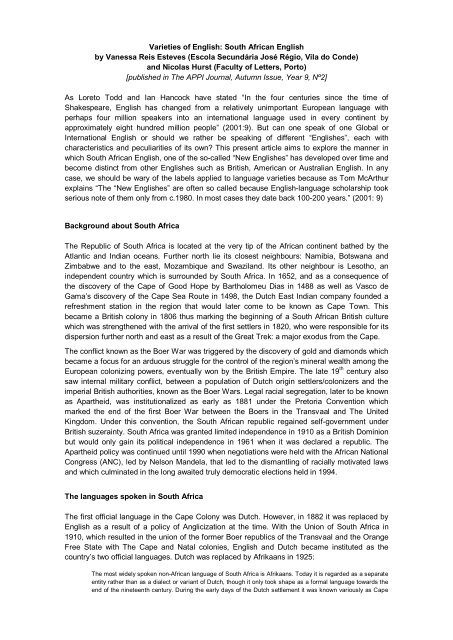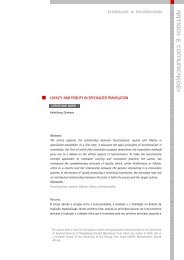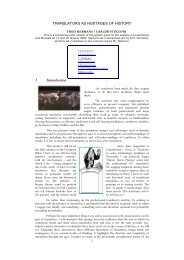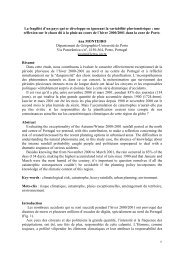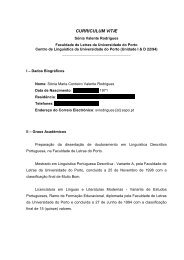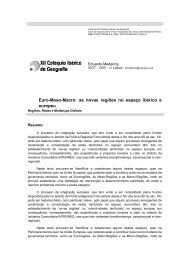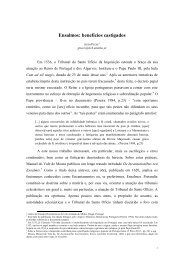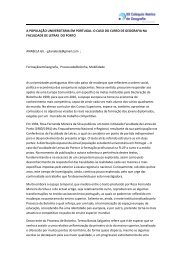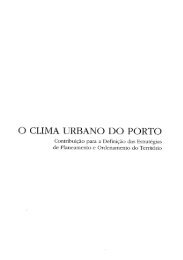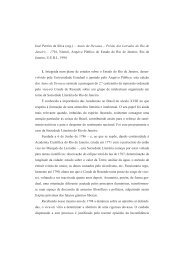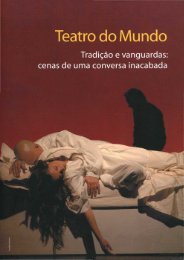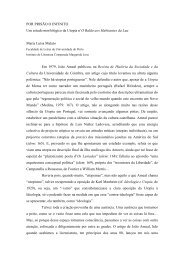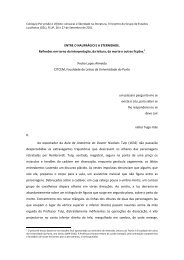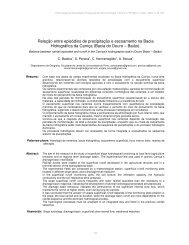Varieties of English: South African English by Vanessa Reis Esteves ...
Varieties of English: South African English by Vanessa Reis Esteves ...
Varieties of English: South African English by Vanessa Reis Esteves ...
Create successful ePaper yourself
Turn your PDF publications into a flip-book with our unique Google optimized e-Paper software.
<strong>Varieties</strong> <strong>of</strong> <strong>English</strong>: <strong>South</strong> <strong>African</strong> <strong>English</strong><br />
<strong>by</strong> <strong>Vanessa</strong> <strong>Reis</strong> <strong>Esteves</strong> (Escola Secundária José Régio, Vila do Conde)<br />
and Nicolas Hurst (Faculty <strong>of</strong> Letters, Porto)<br />
[published in The APPI Journal, Autumn Issue, Year 9, Nº2]<br />
As Loreto Todd and Ian Hancock have stated “In the four centuries since the time <strong>of</strong><br />
Shakespeare, <strong>English</strong> has changed from a relatively unimportant European language with<br />
perhaps four million speakers into an international language used in every continent <strong>by</strong><br />
approximately eight hundred million people” (2001:9). But can one speak <strong>of</strong> one Global or<br />
International <strong>English</strong> or should we rather be speaking <strong>of</strong> different “<strong>English</strong>es”, each with<br />
characteristics and peculiarities <strong>of</strong> its own? This present article aims to explore the manner in<br />
which <strong>South</strong> <strong>African</strong> <strong>English</strong>, one <strong>of</strong> the so-called “New <strong>English</strong>es” has developed over time and<br />
become distinct from other <strong>English</strong>es such as British, American or Australian <strong>English</strong>. In any<br />
case, we should be wary <strong>of</strong> the labels applied to language varieties because as Tom McArthur<br />
explains “The “New <strong>English</strong>es” are <strong>of</strong>ten so called because <strong>English</strong>-language scholarship took<br />
serious note <strong>of</strong> them only from c.1980. In most cases they date back 100-200 years.” (2001: 9)<br />
Background about <strong>South</strong> Africa<br />
The Republic <strong>of</strong> <strong>South</strong> Africa is located at the very tip <strong>of</strong> the <strong>African</strong> continent bathed <strong>by</strong> the<br />
Atlantic and Indian oceans. Further north lie its closest neighbours: Namibia, Botswana and<br />
Zimbabwe and to the east, Mozambique and Swaziland. Its other neighbour is Lesotho, an<br />
independent country which is surrounded <strong>by</strong> <strong>South</strong> Africa. In 1652, and as a consequence <strong>of</strong><br />
the discovery <strong>of</strong> the Cape <strong>of</strong> Good Hope <strong>by</strong> Bartholomeu Dias in 1488 as well as Vasco de<br />
Gama’s discovery <strong>of</strong> the Cape Sea Route in 1498, the Dutch East Indian company founded a<br />
refreshment station in the region that would later come to be known as Cape Town. This<br />
became a British colony in 1806 thus marking the beginning <strong>of</strong> a <strong>South</strong> <strong>African</strong> British culture<br />
which was strengthened with the arrival <strong>of</strong> the first settlers in 1820, who were responsible for its<br />
dispersion further north and east as a result <strong>of</strong> the Great Trek: a major exodus from the Cape.<br />
The conflict known as the Boer War was triggered <strong>by</strong> the discovery <strong>of</strong> gold and diamonds which<br />
became a focus for an arduous struggle for the control <strong>of</strong> the region’s mineral wealth among the<br />
European colonizing powers, eventually won <strong>by</strong> the British Empire. The late 19 th century also<br />
saw internal military conflict, between a population <strong>of</strong> Dutch origin settlers/colonizers and the<br />
imperial British authorities, known as the Boer Wars. Legal racial segregation, later to be known<br />
as Apartheid, was institutionalized as early as 1881 under the Pretoria Convention which<br />
marked the end <strong>of</strong> the first Boer War between the Boers in the Transvaal and The United<br />
Kingdom. Under this convention, the <strong>South</strong> <strong>African</strong> republic regained self-government under<br />
British suzerainty. <strong>South</strong> Africa was granted limited independence in 1910 as a British Dominion<br />
but would only gain its political independence in 1961 when it was declared a republic. The<br />
Apartheid policy was continued until 1990 when negotiations were held with the <strong>African</strong> National<br />
Congress (ANC), led <strong>by</strong> Nelson Mandela, that led to the dismantling <strong>of</strong> racially motivated laws<br />
and which culminated in the long awaited truly democratic elections held in 1994.<br />
The languages spoken in <strong>South</strong> Africa<br />
The first <strong>of</strong>ficial language in the Cape Colony was Dutch. However, in 1882 it was replaced <strong>by</strong><br />
<strong>English</strong> as a result <strong>of</strong> a policy <strong>of</strong> Anglicization at the time. With the Union <strong>of</strong> <strong>South</strong> Africa in<br />
1910, which resulted in the union <strong>of</strong> the former Boer republics <strong>of</strong> the Transvaal and the Orange<br />
Free State with The Cape and Natal colonies, <strong>English</strong> and Dutch became instituted as the<br />
country’s two <strong>of</strong>ficial languages. Dutch was replaced <strong>by</strong> Afrikaans in 1925:<br />
The most widely spoken non-<strong>African</strong> language <strong>of</strong> <strong>South</strong> Africa is Afrikaans. Today it is regarded as a separate<br />
entity rather than as a dialect or variant <strong>of</strong> Dutch, though it only took shape as a formal language towards the<br />
end <strong>of</strong> the nineteenth century. During the early days <strong>of</strong> the Dutch settlement it was known variously as Cape
Dutch or <strong>South</strong> <strong>African</strong> Dutch, or simple “the taal” (language) <strong>of</strong> hearth and home, and it was used alongside<br />
the formal speech <strong>of</strong> the Netherlands.” (Elmes, 2001: 84)<br />
With the passing <strong>of</strong> time, Afrikaans and its speakers came to be associated with the Apartheid<br />
policy, social exclusion and injustice. Many racial connotations arose: “Afrikaans speakers are<br />
<strong>by</strong> no means exclusively white, yet in recent history the language has been deeply mired in the<br />
racist administrations <strong>of</strong> the apartheid era. In fact, despite centuries <strong>of</strong> linguistic interaction<br />
between the communities there are still, it seems, strong divisions in south Africa between those<br />
who speak <strong>English</strong> and those who retain Afrikaans as their first language <strong>of</strong> choice.” (Elmes,<br />
2001:84) John Kani, a well known <strong>South</strong> <strong>African</strong> actor who is also a writer and the Artistic<br />
Director <strong>of</strong> The Market Theatre <strong>of</strong> Johannesburg explains this aversion to Afrikaans <strong>by</strong> saying<br />
that:<br />
We turned it around as the most powerful weapon <strong>of</strong> making the master understand in his language,<br />
understand in his culture, that we are free <strong>African</strong>s and that this is our land. The thing that prompted <strong>English</strong><br />
was that the <strong>African</strong>s immediately recognized Afrikaans as the language <strong>of</strong> the oppressor, so they then<br />
preferred basically to speak <strong>English</strong>, because after 1848 it’s almost as if the <strong>English</strong> began to say “It’s not us,<br />
it’s them! As far as we are concerned you could be free today- though we will do nothing about it, we will not<br />
assist you in getting free today- but do not blame us any more. We’re not in government, we’re now in<br />
opposition”. (Elmes, 2001: 88)<br />
Indeed, <strong>English</strong> came to be accepted as the language <strong>of</strong> opposition when it was adopted <strong>by</strong> the<br />
ANC as their and the country’s language <strong>of</strong> struggle. It was at the heart <strong>of</strong> the racial conflict in<br />
1976 in Soweto during the Soweto riots when an attempt was made to teach Maths and some<br />
other subjects in Afrikaans: “<strong>English</strong> gradually became the language <strong>of</strong> opposition; even more<br />
so following the declaration <strong>of</strong> an apartheid policy in 1948….Afrikaans <strong>by</strong> contrast, has become<br />
the language <strong>of</strong> the oppressor, the language <strong>of</strong> the hated passbooks.” (McCrum et al, 1986,<br />
304/305).<br />
Nowadays, <strong>South</strong> Africa is a country which is known for its diversity in various walks <strong>of</strong> life. In<br />
common with several other British ex-colonies in Africa (Nigeria and Kenya, for example), <strong>South</strong><br />
Africa is a multilingual country but it has an unusually high total <strong>of</strong> eleven <strong>of</strong>ficial languages<br />
(Afrikaans, <strong>English</strong>, IsiNdebele, IsiXhosa, IsiZulu, Sespedi, Sesotho, Setswana, SiSwati,<br />
Tshivenda and Xitsonga) which are granted equal status <strong>by</strong> the country’s constitution so as to<br />
cater for the country’s diversity in terms <strong>of</strong> its people and cultures. The following languages are<br />
also mentioned in the constitution despite not being <strong>of</strong>ficial languages: Khoi, Nama and San<br />
languages, sign language, Arabic, German, Greek, Gujarti, Hebrew, Hindi, Portuguese,<br />
Sanskrit, Tamil, Telegu and Urdu. A few indigenous creoles and pidgins are also spoken. As Dr<br />
Neville Alexander from the University <strong>of</strong> Cape Town points out, this was one <strong>of</strong> the central<br />
concerns throughout the negotiation process that led to the country’s first non-racial elections in<br />
1994.<br />
“Before the first non-racial elections in April 1994 most people assumed that <strong>English</strong> would become the only,<br />
or at least the main language <strong>of</strong> teaching in educational institutions. … the dialectic <strong>of</strong> <strong>South</strong> <strong>African</strong> history,<br />
however ordained otherwise. Because <strong>of</strong> the passionate commitment <strong>of</strong> white Afrikaans-speaking <strong>South</strong><br />
<strong>African</strong>s to their language, their political representatives during the negotiation process in the early 90s<br />
insisted on the continued equality <strong>of</strong> Afrikaans with <strong>English</strong> as a condition for ceding <strong>of</strong>fice to the<br />
representatives <strong>of</strong> the liberation movement. These, in turn, for obvious political reasons could not concede to<br />
Afrikaans what they did not also give to the indigenous languages. Hence, the 11 <strong>of</strong>ficial languages <strong>of</strong> the new<br />
<strong>South</strong> Africa." (Neville, 2000.)<br />
A different perspective on the significance <strong>of</strong> <strong>English</strong> to the general population should also be<br />
noted: “The new political dispensation that began in 1994 has accelerated the spread and value<br />
<strong>of</strong> <strong>English</strong> among the Blacks and, <strong>by</strong> extension, this institutionalized BSAE across a wider array<br />
<strong>of</strong> social domains despite the constitutional commitments to 11 <strong>of</strong>ficial languages. It has indeed<br />
been attested that <strong>English</strong> has, in the post-apartheid era, become the most dominant <strong>of</strong>ficial<br />
language that is used in the media, technology, commerce and government due to its<br />
association with social mobility.” (Makalela 2004: 357)
In addition, <strong>English</strong> has a special status as the most commonly spoken language in <strong>of</strong>ficial and<br />
commercial public life. It is the country’s Lingua Franca, a condition that in itself is not without a<br />
certain amount <strong>of</strong> controversy as Penny Silva, The , Editor <strong>of</strong> the Oxford Dictionary <strong>of</strong> <strong>South</strong><br />
<strong>African</strong> <strong>English</strong> explains:<br />
“<strong>English</strong> has a very powerful role in <strong>South</strong> Africa today. It’s quite a paradoxical role, I feel. People have a<br />
mixed attitude to it if it’s not their own language. It’s seen as a major resource, and for the upwardly mobile it’s<br />
the language <strong>of</strong> business, education, the media, international discussion. And so people have a tremendous<br />
ambition to learn it and to speak it well. But I would say that it’s also seen as probably a bit <strong>of</strong> a juggernaut,<br />
and I think there’s a lot <strong>of</strong> worry amongst speakers <strong>of</strong> smaller languages in <strong>South</strong> Africa, especially the <strong>African</strong><br />
languages, that <strong>English</strong> is going to sweep all before it. But there’s no doubt that it has played an extremely<br />
important role in communication, starting really from the time <strong>of</strong> negotiations, just before the change <strong>of</strong><br />
government. For quite a few decades it had been a Cinderella, and I think at that point it came back into its<br />
own again” (Elmes, 2001: 81).<br />
It is a compulsory subject in all schools in addition to being the medium <strong>of</strong> instruction in many<br />
schools and universities.<br />
<strong>English</strong> is currently the dominant language <strong>of</strong> teaching in <strong>South</strong> Africa. Indeed for most children <strong>of</strong> an <strong>African</strong>language<br />
background almost all education after the first three years <strong>of</strong> schooling is in <strong>English</strong>. …The 1997<br />
policy was intended to sustain the home language throughout the educational career <strong>of</strong> the learner, preferably<br />
as a medium, but in any case as a subject. In practice, however, it is not possible for children from an <strong>African</strong><br />
language background to receive instruction through the medium <strong>of</strong> their home language beyond Grade 3 or 4.<br />
In fact one <strong>of</strong> the ineffable ironies <strong>of</strong> the new <strong>South</strong> Africa is that the only children who have mother tongue<br />
education (L1-medium) are precisely those who have been advantaged in most other respects in the course<br />
<strong>of</strong> <strong>South</strong> Africa’s history: <strong>English</strong> and Afrikaans speaking children.<br />
(Neville, 2000)<br />
Estimates based on the 2001 census reveal that 45% <strong>of</strong> the <strong>South</strong> <strong>African</strong> population has a<br />
knowledge <strong>of</strong> spoken <strong>English</strong>. However, it is interesting to note that it is only the fifth most<br />
spoken home language. According to the 2001 census, IsiZulu is the mother tongue <strong>of</strong> 23.8% <strong>of</strong><br />
the <strong>South</strong> <strong>African</strong> population, followed <strong>by</strong> IsiXhosa (17.6%), Afrikaans (13.3%), Sepedi (9.4%)<br />
and finally, <strong>English</strong> and Setswana (8.2% respectively).<br />
It is somewhat surprising that one in every three <strong>English</strong> speakers are from a European derived<br />
community: both the <strong>South</strong> <strong>African</strong> Asian and Chinese communities are largely <strong>English</strong><br />
speaking communities as well as retaining their languages <strong>of</strong> origin. The result <strong>of</strong> all this<br />
linguistic diversity is that <strong>English</strong> has been established as a unique variety containing strong<br />
influences from Afrikaans and the country’s many <strong>African</strong> languages. Thus, <strong>South</strong> <strong>African</strong><br />
<strong>English</strong> is spiced with various words and phrases from Afrikaans, IsiZulu and Nama to mention<br />
just a few.<br />
<strong>South</strong> <strong>African</strong> <strong>English</strong><br />
As Tom McArthur points out <strong>South</strong> <strong>African</strong> <strong>English</strong> is becoming more and more autonomous<br />
which has inevitably led to “a strengthening <strong>of</strong> confidence in the local variety <strong>of</strong> <strong>English</strong> (…) The<br />
accelerated development, in for example, Australia, Canada, New Zealand, and <strong>South</strong> Africa, <strong>of</strong><br />
dictionary and other projects that increase the cohesion and autonomy <strong>of</strong> their own <strong>English</strong>es<br />
and reduce dependence on UK and US standards. Such developments tend to go hand-in-hand<br />
with a sympathetic approach to both endangered indigenous languages and “heritage<br />
languages” <strong>of</strong> immigrants in such countries.” (2001: 10). Social variation is a characteristic that<br />
is present in <strong>South</strong> <strong>African</strong> <strong>English</strong>. This variation has been divided into three main groups:<br />
Cultivated, General and Broad <strong>English</strong>. The first is close to Received Pronunciation and is<br />
associated with the upper class. General <strong>English</strong> is representative <strong>of</strong> the middle class and<br />
lastly, broad <strong>English</strong> is associated with the working class in addition to speakers <strong>of</strong> an Afrikaans<br />
descent who speak <strong>English</strong> as a second language.<br />
Lexicon<br />
The vocabulary <strong>of</strong> a language reflects more than mere words, which in turn, represent the<br />
reality around us. Vocabulary goes as far as to reflect a country’s people and culture. As
Charles Barber suggests, “It is perhaps in vocabulary that we see the greatest divergence<br />
between the different varieties <strong>of</strong> <strong>English</strong> as a first language.” (2000: 252.) This because, life in<br />
the new colonies was indeed very divergent to what it had been in the old European continent.<br />
As such, the settlers in the new colonies rapidly felt an urgent need to adapt already existing or<br />
old words in the <strong>English</strong> language or even to create new ones, so as to express the reality in<br />
which they now found themselves in. This gave rise to the creation <strong>of</strong> a whole new lexicon<br />
capable <strong>of</strong> meeting the needs <strong>of</strong> a new society and environment. As such, <strong>South</strong> <strong>African</strong><br />
<strong>English</strong> has received many loans from the many native languages spoken in the country as this<br />
is the most common way <strong>of</strong> forming new vocabulary.<br />
Afrikaans has provided a number <strong>of</strong> significant contributions to <strong>South</strong> <strong>African</strong> <strong>English</strong>. As Elmes<br />
stresses: “About half the words in the national lexicon that are distinctively <strong>South</strong> <strong>African</strong><br />
originate in Afrikaans: words such as “klo<strong>of</strong>” (valley), “veld” (open country) and “dorp” (village).<br />
(Elmes, 2001:85) Penny Silva considers that this process <strong>of</strong> assimilation began immediately<br />
upon the settler’s arrival in the country:<br />
“They started from the very first day. People landed on the beach at Port Elizabeth and they were collected <strong>by</strong><br />
Dutch farmers in their wagons and taken up the country to the area <strong>of</strong> Grahamstown, and they picked up<br />
words. You can imagine somebody sitting in the back <strong>of</strong> a wagon and pointing at an animal or plant that they<br />
saw and the Dutch farmer giving them the name <strong>of</strong> it.”<br />
In the early diaries, in the first few months, you find the words just popping up as though they’re known<br />
already. They arrived in April 1820 and <strong>by</strong> late April, early May, the diaries are starting to reflect words like<br />
“kraal” as the word for a cattle enclosure, and like “Boer”, because <strong>of</strong> the farmers’ names for themselves. You<br />
get a lot <strong>of</strong> wagon terminology too - “trek” for the journey that you do, the “voorlooper” for the man who led the<br />
cattle. The “voorlooper” was a young boy who took the “riem” as it was called- the leather thong- and led the<br />
oxen along. And your wagon pole, to which the oxen were attached was called the “diesselboom”, and that<br />
starts coming in with all sorts <strong>of</strong> odd, strange spellings. “Thistleboon” was one Anglicised form <strong>of</strong> it. The<br />
wagon chest was the “voorkis”, and that replaces <strong>English</strong> in most <strong>of</strong> the diaries that you find- all sorts <strong>of</strong> quite<br />
technical language coming in from the whole business <strong>of</strong> using wagons and travelling.” (Elmes, 2001:85).<br />
Afrikaans words linked to the country’s climate and foods have also entered the language and<br />
are still in use to this very day. “Biltong” (a type <strong>of</strong> dried meat) is much adored <strong>by</strong> <strong>South</strong> <strong>African</strong>s<br />
as are “beskuit” (dried hard rusks). <strong>South</strong> Africa’s warm climate <strong>of</strong>ten invites its inhabitants to<br />
make a “braai” (barbecue) where they “braai” “braaivleis” (the meat cooked on the barbecue)<br />
and “mealies” (an ear <strong>of</strong> maize) accompanied <strong>by</strong> “pap” (a porridge made from “mealie”).<br />
“Boerewors” (a spicy farmer type sausage usually made from beef) or “sosaties” (kebabs on a<br />
stick) are also a national favourite. <strong>South</strong> <strong>African</strong> “naartjies” (an orange coloured citrus fruit<br />
similar to tangerines) have quite a reputation. “Potjiekos” (a rich stew cooked in a three-legged<br />
cast-iron pot over a fire) is one <strong>of</strong> the country’s traditional dishes. However, the Afrikaans<br />
influence is much vaster than the above mentioned topics. Many children run around in “tekkies”<br />
(trainers) and many people drive a “bakkie” (a pickup truck). If you get into a fight, you can<br />
always “bliksem” (beat up or punch) your aggressor. The list is endless.<br />
<strong>South</strong> <strong>African</strong> <strong>English</strong> has adopted numerous influences from many <strong>of</strong> the local indigenous<br />
<strong>African</strong> languages such as “the Khoi which contributed the click sounds to the Xhosa language,<br />
and to <strong>English</strong> such words as “gnu”” or “eina”.<br />
If the Cape Dutch speakers contributed the largest number <strong>of</strong> items to the <strong>South</strong> <strong>African</strong> lexicon, at 10 per<br />
cent the influence <strong>of</strong> indigenous <strong>African</strong> languages is also considerable. The most important is that <strong>of</strong> the<br />
Khoi, a collective term for a large number <strong>of</strong> gentle, pastoral small tribes <strong>of</strong> indigenous <strong>African</strong> people (who<br />
were not Bantu), found all along the Cape coast from Cape Town into the interior. They were previously<br />
known <strong>by</strong> the term- now deemed unacceptable- Hottentot.” (Elms, 2001: 86)<br />
Penny Silva explains that: “A very central word in <strong>South</strong> <strong>African</strong> <strong>English</strong> from the Khoi language<br />
is the local word for “ouch”, which in <strong>South</strong> <strong>African</strong> <strong>English</strong> is “eina”. I don’t think any <strong>South</strong><br />
<strong>African</strong> children would say “ouch!”, they all say “eina!”…” (Elmes, 2001:87). The word “khaya”<br />
(home) has been loaned from the Nguni group <strong>of</strong> languages. “Mampara” (meaning an idiot or<br />
silly person) has been adopted from the Sotho languages.
A number <strong>of</strong> Zulu words have also been taken on <strong>by</strong> <strong>South</strong> <strong>African</strong> <strong>English</strong>. Take for example<br />
words like “donga” (a type <strong>of</strong> ditch found in <strong>South</strong> Africa from the Zulu word for “wall”), “indaba”<br />
(conference) which in Zulu means “a matter for discussion”, “shongololo” (the Zulu and Xhosa<br />
word for millipede), “amasi” or “maas” (a popular drink made from sour milk) , “gogo” (a<br />
grandmother or elderly woman) or “bonsella” (a surprise gift or bribe) to mention just a few.<br />
<strong>South</strong> <strong>African</strong> <strong>English</strong> also contains quite a number <strong>of</strong> words with strong political associations<br />
as a result <strong>of</strong> the political situation that the country was subject to for several decades.<br />
“Apartheid” (the Afrikaans word for apart-ness) was the name given to the racial segregation<br />
policy in vigor from 1948-90. “Homelands” was a term which designated the “independent”<br />
states in which black <strong>South</strong> <strong>African</strong>s were forced to take citizenship under the Apartheid policy.<br />
“Madiba” is the affectionate name which Nelson Mandela is known <strong>by</strong> and which was derived<br />
from the actual name <strong>of</strong> his clan. “Townships” were the black suburbs on the outskirts <strong>of</strong> cities<br />
and towns in which the black <strong>South</strong> <strong>African</strong>s were forced to live in under the Apartheid policy.<br />
The “State President” was the head <strong>of</strong> state from 1962-94. Nowadays the term “President” is<br />
used.<br />
Yet, the most <strong>of</strong>fensive term used during the Apartheid era which has caused much controversy<br />
in <strong>South</strong> Africa as to whether or not it should be included in the <strong>South</strong> <strong>African</strong> <strong>English</strong><br />
Dictionary, is the term “kaffir”. Melvyn Bragg thinks that the term had a non-<strong>African</strong> origin: “Kaffir<br />
was used to insult the British in India before <strong>English</strong> absorbed it as an insult-word in <strong>South</strong><br />
Africa” (2003: 289). But, according to Penny Silva, Editor <strong>of</strong> the Oxford Dictionary <strong>of</strong> <strong>South</strong><br />
<strong>African</strong> <strong>English</strong>:<br />
“It is actually from Arabic and it means “infidel”. It was used down the east coast <strong>of</strong> Africa, but it’s like “nigger”,<br />
it’s as appalling, and was used in everyday speech all the time <strong>by</strong>, for instance, policemen arresting people on<br />
Pass laws, people being put in jail for hardly anything. If a white person was walking down the street and a<br />
black person got in their way they would be told “Kaffir, get out <strong>of</strong> my way! It was that kind <strong>of</strong> appalling racial<br />
contempt which really hit at the core <strong>of</strong> people’s beings. And it was so strongly regarded that it is now in fact<br />
illegal to use it, and if you use it you can be taken to court and you can be charged with what’s called “crime<br />
and injury”, which is derogatory behavior, insult.” (Elmes, 2001: 94)<br />
Although the majority <strong>of</strong> <strong>South</strong> <strong>African</strong> vocabulary is easily understood <strong>by</strong> British and American<br />
speakers <strong>of</strong> the <strong>English</strong> language, a few particularities are to be found which is demonstrated <strong>by</strong><br />
the following examples: “biscuit” is the equivalent to the American term “cookie”. “Cookie” in<br />
<strong>South</strong> Africa is used to designate a cupcake. “Buck” is the term commonly used to refer to a<br />
Rand, the country’s national currency. A “café” is a convenience store and not a c<strong>of</strong>fee shop.<br />
“Candy floss” is the <strong>South</strong> <strong>African</strong> equivalent for the American term cotton candy. “Costume” is<br />
the word used in <strong>South</strong> Africa for a swimming or bathing costume. A “chemist” not only refers to<br />
a person specialized in Chemistry, but also to a pharmacy or drugstore. Once again the list<br />
could go on.<br />
The phenomenon <strong>of</strong> “code-mixing”, where<strong>by</strong> speakers choose from more than one linguistic<br />
resource to construct their discourse is commonplace: “A similar thing is happening in south<br />
Africa where local words now sit alongside Standard <strong>English</strong>, indicating total acceptance and<br />
signalling the birth <strong>of</strong> another new <strong>English</strong>” (Bragg, 2003: 308). This is certainly true <strong>of</strong> the<br />
Indian community which is considered to be a community with strong roots in <strong>South</strong> Africa. The<br />
first Indian immigrants arrived in Natal in <strong>South</strong> Africa in 1860 to set up plantations. They<br />
continue to constitute a “diverse community speaking at least five or six languages even today<br />
including Hindi, Tamil, Telagu, Gujarati, Urdu, and finally in Cape Town a small language called<br />
Kokani which originated south <strong>of</strong> Bombay. (Elmes, 2001: 92). As such a number <strong>of</strong> Indian words<br />
have found their way into <strong>South</strong> <strong>African</strong> <strong>English</strong> such as “brinjal” (eggplant), a “bunny chow” (a<br />
loaf <strong>of</strong> bread filled with curry which is a speciality in Natal particularly among the Durban Indian<br />
community) or even the particular spelling <strong>of</strong> “samoosa” for the Indian word samosa (chamuça<br />
in Portuguese).<br />
With time, this community came to use a very widespread form <strong>of</strong> what was known as “broken<br />
<strong>English</strong>”, perhaps most famously commented on <strong>by</strong> M.K.Gandhi (1869-1948) during his time as
a political activist in <strong>South</strong> Africa, and which has several generations later produced a local<br />
“variety <strong>of</strong> <strong>English</strong> which mixes features <strong>of</strong> Indian, <strong>South</strong> <strong>African</strong>, Standard British, creole and<br />
foreign language learning <strong>English</strong>es in a fascinating way” (Crystal 2003: 356). One such feature<br />
is the use <strong>of</strong> question tags:<br />
Now in many varieties <strong>of</strong> <strong>English</strong> throughout the world the rules are too complex because you have a choice<br />
<strong>of</strong> pronouns, you have a choice <strong>of</strong> verbs- you could say “isn’t”, “aren’t”, “weren’t”, “didn’t”, “don’t”. And in many<br />
varieties <strong>of</strong> <strong>English</strong> one universal tag is used, and in India it is “isn’t it?” So you would say “Jill is your sister,<br />
isn’t it?”, or “You are coming, isn’t it?” In <strong>South</strong> Africa this has stabilized, and we’ve reduced it even further to<br />
simply “isn’t?”. So you would say “Joan is coming, isn’t?”, and that means “Joan is coming, isn’t she?. Or “He<br />
did it, isn’t?”, and that means “He did it, didn’t he?” (Mesthrie R. in Elmes: 2001: 93).<br />
Pronunciation<br />
There are a number <strong>of</strong> distinctive sounds which distinguish the pronunciation <strong>of</strong> <strong>South</strong> <strong>African</strong><br />
<strong>English</strong>. One should start <strong>of</strong>f <strong>by</strong> stressing the fact that <strong>South</strong> <strong>African</strong> <strong>English</strong> is non-rhotic. This<br />
means that the letter R in words like water and butter is not pronounced. The /r/ in the final<br />
position <strong>of</strong> a word will only be pronounced in the case <strong>of</strong> it being followed <strong>by</strong> a word beginning<br />
with a vowel sound:<br />
Vowels<br />
“In rhotic accents, r is pronounced wherever it is orthographically present: for example, in run, barrel, beard,<br />
war, worker. In non-rhotic accents, r is pronounced in only two situations: in syllable-initial position (as in run)<br />
and inter-vocalically (as in barrel). In such accents it does not occur post-vocalically (as in beard, war, worker)<br />
unless a vowel follows, so that in the writer’s friend no r is pronounced, but it is pronounced in the writer is my<br />
friend.” (McArthur, 2001:13)<br />
Much can be said on this subtopic <strong>of</strong> SAE. The following subsection aims to highlight a few <strong>of</strong><br />
the most common characteristics that are to be found. <strong>South</strong> <strong>African</strong> <strong>English</strong> has what is called<br />
a “kit-bit split”. This can be considered as being the most distinctive feature <strong>of</strong> SAE. Basically it<br />
means that the words kit [kɪt] and bit [bət] do not rhyme: The sound [ɪ] is used when it occurs<br />
next to velars (consonants which are articulated with the back part <strong>of</strong> the tongue [the dorsum]<br />
against the s<strong>of</strong>t palate, the back part <strong>of</strong> the ro<strong>of</strong> <strong>of</strong> the mouth, known also as the velum) as in<br />
the case <strong>of</strong> the following words: kiss, gift, lick, big, sing and kit after /h/ (hit), at the beginning <strong>of</strong><br />
a word as is the case <strong>of</strong> the word “inn”, and before /ʃ/ (fish). Some speakers also use this<br />
sound before /tʃ or dʒ/. On the other hand, [ə] is used before words such as limb, dinner, limited<br />
and bit.<br />
In Cultivated and General SAE the pronunciation <strong>of</strong> /æ/ is slightly raised (as in trap). However,<br />
in Broad varieties, it is <strong>of</strong>ten raised to [ɛ]. This means that /æ/ almost becomes /ɛ/ for some<br />
speakers, as can be exemplified <strong>by</strong> the typical SAE pronunciation <strong>of</strong> the very name <strong>of</strong> the<br />
country <strong>South</strong> Africa, which is pronounced as <strong>South</strong> Efrica.<br />
The /ʊ/ sound in the word foot is generally pronounced as high, back centralised [ʊ]. It is<br />
interesting to note that there is very little lip rounding in comparison to other L1 varieties <strong>of</strong><br />
<strong>English</strong> worldwide. The pronunciation <strong>of</strong> [ʊ] with added lip-rounding only occurs in Broad SAE in<br />
the case <strong>of</strong> Afrikaans <strong>English</strong>.<br />
The /ɑː/ vowel sound in the case <strong>of</strong> words such as bath is usually a low and fully back, [ɑː]. This<br />
low and fully back [ɑː] distinguishes SAE from the other <strong>South</strong>ern Hemisphere varieties (AusE<br />
and NZE). Another indicator <strong>of</strong> SAE is the unstressed vowel at the end <strong>of</strong> words such as happy,<br />
which is usually half-long.<br />
Consonants<br />
Plosives<br />
The following voiced and voiceless plosives (a consonant sound which is produced <strong>by</strong> stopping<br />
the airflow in the vocal tract) are distinctive in <strong>South</strong> <strong>African</strong> <strong>English</strong>: /p, b, t, d, k, g/. These
sounds are generally unaspirated in all positions <strong>of</strong> broad <strong>South</strong> <strong>African</strong> <strong>English</strong> there<strong>by</strong><br />
distinguishing it from the remaining formerly mentioned subcategories, namely general and<br />
cultivated <strong>South</strong> <strong>African</strong> <strong>English</strong>. On the other hand, in the other varieties <strong>of</strong> SAE a voiceless<br />
plosive is aspirated (a strong burst <strong>of</strong> air which is produced with the release <strong>of</strong> some obstruents)<br />
when it comes before a stressed syllable. In the case <strong>of</strong> Broad <strong>South</strong> <strong>African</strong> <strong>English</strong>, this<br />
contrast is neutralised. Alternatively, these speakers have a tendency to pronounce the /t/ and<br />
/d/ sounds with some detention <strong>by</strong> articulating the tongue against the upper teeth.<br />
Fricatives and Affricates<br />
A velar fricative phoneme is one <strong>of</strong> the rare varieties that may be found in the case <strong>of</strong> <strong>South</strong><br />
<strong>African</strong> <strong>English</strong>. However, this only occurs in the case <strong>of</strong> words that have been borrowed from<br />
Afrikaans, Xhosa, Scots and German as can be verified <strong>by</strong> the words gogga /xoxə/ meaning<br />
insect in Afrikaans or the word Bach in German.<br />
A stereotypical feature <strong>of</strong> Broad <strong>South</strong> <strong>African</strong> Afrikaans <strong>English</strong> is the tendency to pronounce<br />
the sound /θ/ as /f/. Thus, the “th” sound is merged with other sounds as in the case <strong>of</strong> the word<br />
three which is pronounced as free. This also occurs in the case <strong>of</strong> Cockney <strong>English</strong>. Another<br />
tendency is to pronounce the sound /h/ as a voiced /ɦ/ when it comes before a stressed vowel.<br />
Sonorants<br />
In the case <strong>of</strong> Broad and a number <strong>of</strong> General SAE varieties, the sound /j/ is strengthened to [ɣ]<br />
before a high front vowel as is the case in the word yield [ɣɪːɫd]. As far as Cultivated and<br />
General SAE are concerned, the sound /r/ is usually considered to be postalveolar<br />
(“[Postalveolar consonants are consonants which are produced when the tongue is near to or<br />
alternatively,] when it touches the back <strong>of</strong> the alveolar ridge. This is located further back in the<br />
mouth than the alveolar consonants, which are at the ridge itself, but not as far back as the hard<br />
palate (the place <strong>of</strong> articulation for palatal consonants). However, Broad varieties <strong>of</strong>ten have an<br />
[ɾ] or sometimes even a trilled [r]. The latter is more common in the case <strong>of</strong> the Afrikaans<br />
<strong>English</strong> as a second language, though it is sometimes stigmatised as marker <strong>of</strong> Broad SAE.<br />
Even though <strong>South</strong> <strong>African</strong> <strong>English</strong> is non-rhotic there is some evidence <strong>of</strong> the presence <strong>of</strong> a<br />
postvocalic /r/ in some Broad Cape varieties as is the case <strong>of</strong> -er suffixes (e.g. writer). This can<br />
be explained <strong>by</strong> the influence <strong>of</strong> Afrikaans. It could also be a remnant <strong>of</strong> (non-RP) British<br />
<strong>English</strong> which was brought over <strong>by</strong> the settlers. It is interesting to note that the Postvocalic /r/<br />
seems to be becoming a part <strong>of</strong> the younger generation’s speech as a direct result <strong>of</strong> the<br />
influence <strong>of</strong> the American dialect.<br />
Social factors are not alone in determining the accents <strong>of</strong> <strong>English</strong> speakers in <strong>South</strong> Africa:<br />
“Lanham and McDonald’s sociohistorical description <strong>of</strong> <strong>South</strong> <strong>African</strong> <strong>English</strong> (1979) illustrates<br />
the interaction <strong>of</strong> social and regional factors in different varieties <strong>of</strong> this form <strong>of</strong> <strong>English</strong>. They<br />
show how the settlement <strong>of</strong> different regions in <strong>South</strong> Africa <strong>by</strong> different social groups from<br />
England has contributed to present-day patterns <strong>of</strong> social and regional variation” (Graddol et al,<br />
1996: 275/276) where<strong>by</strong> in the eastern Cape both middle and working class speakers are likely<br />
to use the more extreme or “broad” variety.<br />
<strong>South</strong> <strong>African</strong> Cultural Life.<br />
In terms <strong>of</strong> literary output, <strong>South</strong> Africa’s cultural scene is dominated <strong>by</strong> two Nobel Prize<br />
winners: Nadine Gordimer and J.M. Coetzee. Gordimer began publishing in the 1950s (short<br />
stories and later novels) and was awarded the Nobel Prize for Literature in 1991. Her work<br />
incorporates both liberal and radical attitudes, articulating the social contradictions and moral<br />
complexities <strong>of</strong> a white author confronted with the effects <strong>of</strong> colonialism and racial segregation,<br />
perhaps most powerfully in “Judy’s People” (1981). Coetzee was awarded the same prize in<br />
2003 having already published a substantial body <strong>of</strong> work, beginning in the 1970s, and having<br />
previously won two Booker prizes in Britain, in 1983 for “Life and Times <strong>of</strong> Michael K” and in<br />
1999 for “Disgrace”. His work generally deals with local perspectives on issues <strong>of</strong> history,
authority and power, even within the structure <strong>of</strong> a fictionalised memoir <strong>of</strong> his life: the third in his<br />
series being “Summertime” (2009).<br />
There is also a more populist strand within this heritage dating back to the late 19th century.<br />
Rider Haggard produced many bestsellers telling tales <strong>of</strong> heroic <strong>English</strong>men and their<br />
adventures in the “dark” continent, including “King Soloman’s Mines” (1886) and “She” (1887),<br />
both <strong>of</strong> which have been adapted for the cinema. From the 1960s, Wilbur Smith’s fast moving<br />
narratives provided a more recent best-selling variation <strong>of</strong> the white man’s adventure theme<br />
with added sex and violence with works such as “Where the Lion Feeds” (1964) and “The<br />
Sound <strong>of</strong> Thunder” (1966). In these works the native <strong>African</strong> population is rarely fully<br />
characterised, fulfilling the function <strong>of</strong> loyal servant or menacing threat, something which clearly<br />
has been redressed in the literature produced <strong>by</strong> Black <strong>South</strong> <strong>African</strong>s which can be traced<br />
back to the publication in 1930 <strong>of</strong> “Mhundi” <strong>by</strong> Sol Thekiso Plaatje. In addition to his literary<br />
significance, Plaatje was also a founding father <strong>of</strong> the ANC, indeed it is hard to separate<br />
literature from politics in this setting. For example, Alan Paton, whose 1948 novel “Cry, The<br />
Beloved Country” became a worldwide success later lead the Liberal Party and championed<br />
non-violent opposition to apartheid or Breyten Breytenbach’s 1976 work “A Season in Paradise”<br />
or André Brink who published “A Dry White Season” in 1982: two writers who had huge<br />
problems with the white supremacist regime. Nowadays, writers such as Zakes Mda<br />
(Commonwealth Prize winner for “The Heart <strong>of</strong> Redness” in 2001), K Sello Duiker ( “The Quiet<br />
Violence <strong>of</strong> Dreams” in 2001) and Zoe Wicomb (M-Net Book Prize winner for “David’s Story” in<br />
2001) continue to examine <strong>South</strong> Africa’s past and present tensions and legacies and continue<br />
to redefine <strong>South</strong> Africa’s hybrid literary identity while the mantle <strong>of</strong> producing bestsellers has<br />
passed to John van de Ruit and his “Spud” series (2006 Booksellers award).<br />
Literature provides much <strong>of</strong> the inspiration for films which deal with the <strong>South</strong> <strong>African</strong> context:<br />
notable examples would be the 1989 production <strong>of</strong> “A Dry White Season” starring Donald<br />
Sutherland and Marlon Brando or “Cry, The Beloved Country” starring James Earl Jones and<br />
Richard Harris (released in 1995) or the 2002 adaptation <strong>of</strong> “Promised Land” based on the<br />
Afrikaans novel “Na die Geliefde Land” (1972) <strong>by</strong> Karel Schoeman. The best selling book <strong>of</strong> all<br />
time in <strong>South</strong> Africa, the above mentioned “Spud” is also being developed for the big screen <strong>by</strong><br />
Rogue Star Films, a local company that has been responsible for several recent successes:<br />
“The Story <strong>of</strong> an <strong>African</strong> Farm” (2004), “U- Carmen E-khayelitsha”, a Golden Bear winner at the<br />
Berlin Film Festival in 2005, “Big Fellas”, a 2007 comedy and “Confessions <strong>of</strong> a Gambler”, a<br />
2008 adaptation <strong>of</strong> the award winning novel <strong>by</strong> Rayda Jacobs about a female, Muslim gambling<br />
addict. Film makers in <strong>South</strong> Africa take risks: “Son <strong>of</strong> Man” is a 2005 film directed <strong>by</strong> Mark<br />
Dornford-May which was the first <strong>South</strong> <strong>African</strong> movie to make its debut at Sundance Film<br />
Festival in the USA; it places Jesus in a contemporary context <strong>of</strong> segregation and conflict in<br />
southern Africa: the struggle to find peace and love and survive deception and betrayal. Or<br />
“District 9”, a 2009 film directed <strong>by</strong> Neill Blomkamp and produced <strong>by</strong> Peter Jackson (director <strong>of</strong><br />
the “Lord <strong>of</strong> the Rings” trilogy) and inspired <strong>by</strong> historical events and issues from the apartheid<br />
era (segregation/forced relocation) but situated in a science fiction context and making use <strong>of</strong> a<br />
false documentary style. The film has recently been on general release in Portugal and received<br />
very positive reviews.<br />
The music scene in <strong>South</strong> Africa is focused around four major centres, Johannesburg, Cape<br />
Town, Durban and Bloemfontein, where all manner <strong>of</strong> musical genres are in evidence and local<br />
talent is actively promoted; for example Bloemfontein has a reputation for both Afrikaans based<br />
music and heavy metal whereas Cape Town has a more experimental, underground emphasis.<br />
Pop styles are based on two major sources, Zulu isicathamiya singing and harmonic mbaqanga<br />
but two <strong>of</strong> the country’s most famous international artists, Miriam Makeba (1932/2008) and<br />
Ladysmith Black Mambazo trace their origins back to different genres. Miriam Makeba was a<br />
central figure in the <strong>African</strong> jazz scene throughout the 1950s and <strong>by</strong> the early 1960s, she was<br />
an international star and brought attention to <strong>South</strong> <strong>African</strong> apartheid. She married the Black<br />
Panther activist Stokely Carmichael in the USA and for many years never returned to <strong>South</strong>
Africa, campaigning abroad against social injustice. Ladysmith Black Mambazo arose in the<br />
1960s, with their roots in gospel and a capela style music and became perhaps the biggest<br />
isicathamiya stars in <strong>South</strong> Africa's history. In 1986, Paul Simon (<strong>of</strong> Simon and Garfunkel fame)<br />
included the group on his extremely popular Graceland album and its subsequent tour <strong>of</strong> 1987<br />
and they achieved an international status which is still valid today.<br />
The <strong>English</strong> language has indeed become a valuable tool in <strong>South</strong> Africa. Not only does it<br />
reflect the variety and richness <strong>of</strong> the <strong>South</strong> <strong>African</strong> culture and reality but it can also be<br />
considered to be an empowering and liberating tool <strong>of</strong> expression. As John Kani puts it:<br />
Bibliography<br />
The <strong>English</strong> language is able to evoke within the culture <strong>of</strong> people that catalyst that made them go back to<br />
their own language with greater pride and greater interest <strong>of</strong> finding out more about it. Because it could even<br />
be explained in <strong>English</strong> how important it is not to loose your language, how important it is to hold on to your<br />
culture, how important it is to retain the Xhosa in you- all this could be explained in <strong>English</strong>. So the <strong>English</strong><br />
became a used tool for us, to further our own aims <strong>of</strong> the <strong>African</strong> agenda.<br />
When I stand on the stage as Othello, don’t be misled, I’m thinking in Xhosa, I’m not thinking in <strong>English</strong>. I still<br />
go to sleep at night and dream in my native language. I have to dream in Xhosa. But my children grow up with<br />
the two languages at the same time from age day one. We speak to them in both languages- I have eight<br />
children- so they are quite conversant in both languages. So we’re able to cross-think in both languages.<br />
So we have colonised <strong>English</strong> to make it serve us in repayment <strong>of</strong> what Queen Victoria did to us. So we have<br />
a slave called <strong>English</strong>, and it serves us well.” (Elmes, Simon, 2001: 95).<br />
Alexander, Neville (2000) Global <strong>English</strong>: The European Lessons in December 14 th edition <strong>of</strong><br />
Learning <strong>English</strong>, the Guardian Weekly’s <strong>English</strong> Language teaching supplement.<br />
Barber, Charles (2000) The <strong>English</strong> Language: A Historical Introduction, Cambridge: Cambridge<br />
University Press.<br />
Bragg, Melvyn (2003) The Adventure <strong>of</strong> <strong>English</strong>, London, Hodder and Stoughton.<br />
Crystal, David (2003) The Cambridge Encyclopedia <strong>of</strong> The <strong>English</strong> Language (2 nd Edition),<br />
Cambridge, Cambridge University Press.<br />
Elmes, Simon (2001) The Routes <strong>of</strong> <strong>English</strong>, London: BBC Adult Learning.<br />
Graddol, David, Dick Leith and Joan Swann (1996) <strong>English</strong>: history, diversity and change,<br />
London, Routledge.<br />
Makalela, Leketi (2004) Making sense <strong>of</strong> BSAE for linguistic democracy in <strong>South</strong> Africa, World<br />
<strong>English</strong>es, Vol.23, Nº3, pp.355-366.<br />
McArthur, Tom (2001) World <strong>English</strong> and world <strong>English</strong>es: Trends, tensions, varieties, and<br />
standards, in Language Teaching, Nº34, Vol. 9, Cambridge: Cambridge University Press.<br />
McCrum, Robert; William Cran and Robert O’Neil (1986) The Story <strong>of</strong> <strong>English</strong>, London, Faber<br />
and Faber.<br />
Todd, Loreto & Ian Hancock (1986) International <strong>English</strong> Usage cited <strong>by</strong> McArthur, Tom, World<br />
<strong>English</strong> and world <strong>English</strong>es: Trends, tensions, varieties, and standards, in Language Teaching,<br />
34, 2001: 5, Cambridge: Cambridge University Press.<br />
Electronic resources:
http://www.geocities.com/Athens/7734/accent.htm<br />
http://www.southafrica.info/travel/advice/saenglish.htm<br />
http://en.wikipedia.org/wiki/<strong>South</strong>_<strong>African</strong>_<strong>English</strong><br />
http://www.southafrica.info/about/people/language.htm


